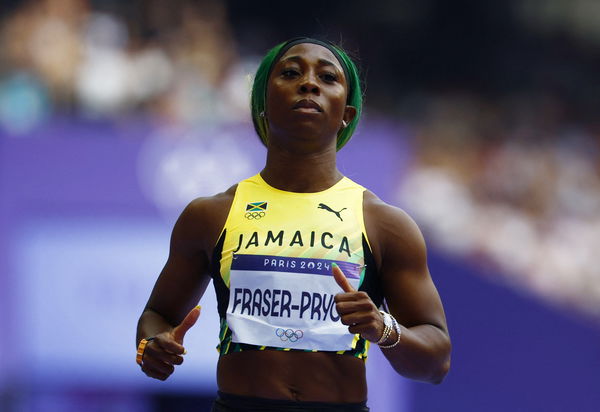
Imago
Shericka Jackson and Shelly-Ann Fraser-Pryce (Image Credit: X)

Imago
Shericka Jackson and Shelly-Ann Fraser-Pryce (Image Credit: X)
Jaws on the floor, eyes wide in disbelief, for reasons more than one. No one was expecting Jamaica, the track powerhouse, to lose to Great Britain, but that happened. Yet, the one storyline that kept everyone’s ears ringing as the yellow and orange vests took position at the World Athletics Relays in Guangzhou in the 4x100m relay was: When did Spain get so good at relays? Making it to the finals is one thing, but a silver win behind the Britons and ahead of Jamaica and the USA proved their journey up to that point was no fluke either. Meanwhile, Jamaica ended up third. But could they have had a better chance at the gold had their coach made an important change?
Watch What’s Trending Now!
When you take their personal bests into consideration, one would observe that their quartet—Natasha Morrison, Shelly-Ann Fraser-Pryce, Tina Clayton, and Shericka Jackson—had 10.85, 10.60, 10.95, and 10.65, respectively, up on the charts. Now, add them together, and you expect them to finish in 43.1 seconds. Instead, they did it in 42.33 seconds. Good enough, right? Not quite.
In hindsight, perhaps Leah Anderson’s inclusion would have switched things up for the better. And as it turns out, coach and Olympic gold medallist Derrick Adkins did entertain the thought. “We thought about World Relays. The Jamaican federation sent out the usual forms to athletes who’ve previously committed to the country, but we decided together not to send her,” Derrick Adkins told Sportsmax.TV. That’s interesting because, although she is mainly a distance runner, her 400m form has been excellent. Take her best outing in Arkansas (51.15 seconds) on Friday, for instance. In fact, her early-season form hinted that she could be a part of their 4x400m squad. Yet, the coach didn’t deem the 25-year-old ready to make it to the roster. And here’s why he thought so:
“It wasn’t an injury issue… It was more dietary. Leah naturally weighs around 110 pounds, but we try to keep her at 115 for optimal performance. She made a dietary change about a month before World Indoors that just didn’t work, and the long trip to China caused her to lose more weight. She just didn’t have the energy.” Travel was a major factor that affected Anderson. “It’s one of the longest trips you can make, especially coming from the East Coast of the U.S.,” Adkins explained. “Multiple connecting flights, several time zones. She was tired when she got there, and even more tired when she got back.” But that’s not where it ends.
Anderson also found it difficult to adjust to the food available overseas. “She just didn’t feel like herself… And to top it off, she made some strategic errors in her race. She was a little too excited—it was her first World Championships appearance as an individual, not on a relay, and I think she was still learning how to handle the moment,” the coach explained. Owing to these experiences, the choice not to make a comeback in China seems like a sound decision. “She was a little pessimistic about going back to China again so quickly. And I, personally, saw it as a better choice to have her stay here and run some open races where she could target new PRs.”
Looks like it worked because her personal best in Arkansas on May 9 validated their decision to focus more on domestic preparation. “She loves Jamaica and would have loved to represent the country at World Relays,” Adkins added further. “But we made this decision to strengthen her chances at the Jamaican trials and ultimately qualify for the World Championships in Tokyo. The competition at nationals is going to be fierce—those girls are going to be running 49s.”
Yet, Anderson has a busy schedule. With the Racers Grand Prix in Kingston on June 7 and a couple of other events (which include one race in Orlando, the coming months will be crucial for her. No wonder her coach said, “She needs to know how to run that open 400 a lot better if she’s going to be competitive in Kingston… This was about the long game—not just showing up for the team, but putting herself in a real position to make the team.” Their decision-making worked for Anderson. But many track and field fans still have a looming question: How did Jamaica lose to Great Britain?
Great Britain pulls the rug from under Shericka Jackson and Shelly-Ann Fraser-Pryce!
The dream of Jamaica turned into a shock defeat in the World Athletics Relays, May 5, 2025, at Guangzhou, China. The women’s 4x100m final was their time of reckoning, a towering cavalcade of talent, with an awe-inspiring cast. Shericka Jackson, Shelly-Ann Fraser-Pryce, Natasha Morrison, and an upcoming star, Tina Clayton.
Fans thought that it was game over when Shericka got the baton for the anchor leg with a slim lead. However, fate had other plans. In the last leg, Brit’s Success Eduan came from nowhere to catch up with Spain first, then caught Shericka Jackson in the dying meters in Jamaica. The result?

Reuters
Paris 2024 Olympics – Athletics – Women’s 100m Round 1 – Stade de France, Saint-Denis, France – August 02, 2024. Shelly-Ann Fraser-Pryce of Jamaica reacts after the heats. REUTERS/Sarah Meyssonnier
Great Britain snatched gold in 42.21 seconds. Spain followed at 42.28. Jamaica, stunned, finished third in 42.33. Shericka’s disbelief at the finish line said it all—this wasn’t supposed to happen. But the warning signs had already shown on May 4 during the heats. Jamaica’s Heat 2 squad—Tina Clayton, Shelly-Ann Fraser-Pryce, Tia Clayton, and Shericka Jackson—looked unbeatable on paper. Yet, poor baton exchanges and a lack of chemistry told a different story. Spain capitalized, setting a national record of 42.18 to win the heat, while Jamaica finished with 42.51, a season’s best but not enough.
Even with sprint legends like Shericka, the reigning 200m queen, and Shelly-Ann, the five-time world 100m champion, Jamaica couldn’t pull together a clean, dominant run.
